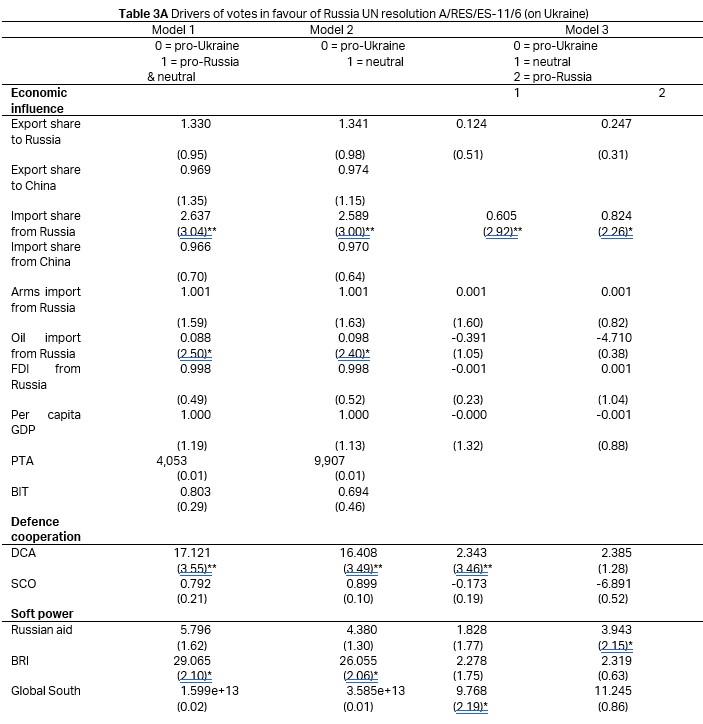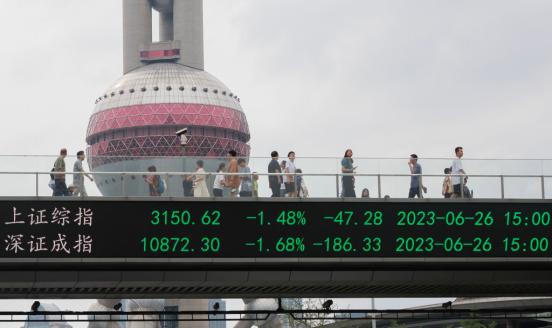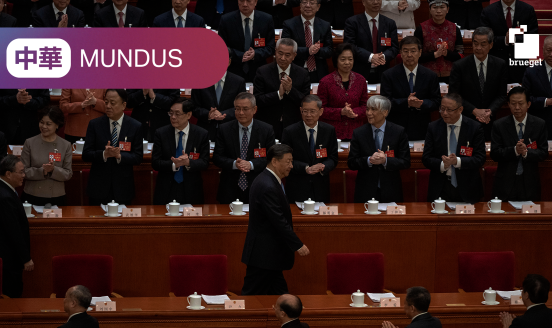What really influences United Nations voting on Ukraine?
Speculation has been triggered about new alliances emerging in the Global South, inspired by China and India's voting behaviour.
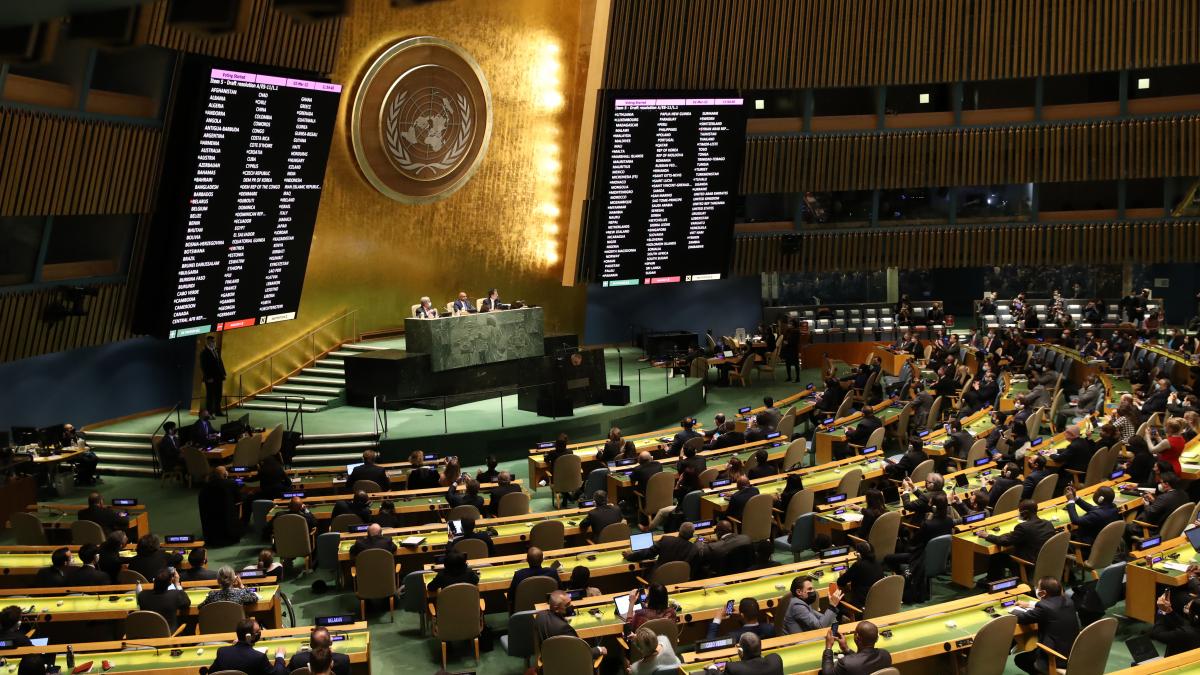
On 2 March 2023, one year on from Russia’s invasion of Ukraine, the United Nations General Assembly approved a nonbinding resolution (A/RES/ES-11/6 1 Available at https://documents-dds-ny.un.org/doc/UNDOC/GEN/N23/063/07/PDF/N2306307.p… ) calling for Russia to end hostilities and withdraw its forces. Among its 193 members, 141 voted for the resolution, exceeding the two-thirds threshold needed for it to pass. Seven members – Belarus, North Korea, Eritrea, Mali, Nicaragua, Russia and Syria – voted against. The remaining 45 either abstained (32 members, including China, India, Iran and South Africa), or were absent (13). Despite the overwhelming vote in favour, those 52 votes, including rejections and neutral positions, have attracted considerable attention, as 45 out of 52 are among the world’s poorest and least industrialised countries, increasingly labelled as the ‘Global South’ 2 Our classification of Global South countries, as opposed to the ‘Global North’, is taken from the United Nations Finance Center for South-South Cooperation, who maintains arguably the world's most reputable and reliable list of Global South countries. See https://worldpopulationreview.com/country-rankings/global-south-countri…. (Figure 1).
This voting behaviour has triggered speculation about new alliances emerging in the Global South, inspired by China and India, the largest in the group, notably adopting positions of neutrality in the conflict. Some point to Russia’s push to capitalise on disillusionment with the United States 3 https://www.washingtonpost.com/world/2023/02/22/global-south-russia-war… , as in Iran and North Korea, to win sympathy in the Global South, but there may be other reasons, including economic reasons. Russia’s trade partners in Asia have seen their trade with Russia balloon since the invasion, with a 400 percent growth in bilateral trade in India’s case. India’s position is particularly illuminating as it seems unwilling to risk its relationship with Russia, on which it depends for military supplies (with 70 percent of its military equipment coming from Russia); India has also benefitted recently from discounted Russian oil. At the same time, India may want to avoid escalating tensions along its borders with China, where tens of thousands of Chinese troops are stationed. In fact, China has shown indirect support to Russia since the invasion of Ukraine, following the ‘limitless friendship’ with Russia since the Olympics in Beijing in February 2022, and this seems to have triggered a similar approach by countries that do not want to displease or irritate China, by officially voting against Russia in the UNGA.
Other Global South countries may also have looked at China’s abstention and their own bilateral relationships with China, such as their participation in China’s Belt and Road Initiative (BRI). Of the 133 Global South countries, 109 are part of the BRI (Table 1). Therefore, it should come as no surprise that voting patterns in the UN resolution condemning Russia’s invasion of Ukraine is very similar when comparing Global South vs. Global North and BRI vs. non-BRI (Figure 2).
Table 1: Global South and BRI
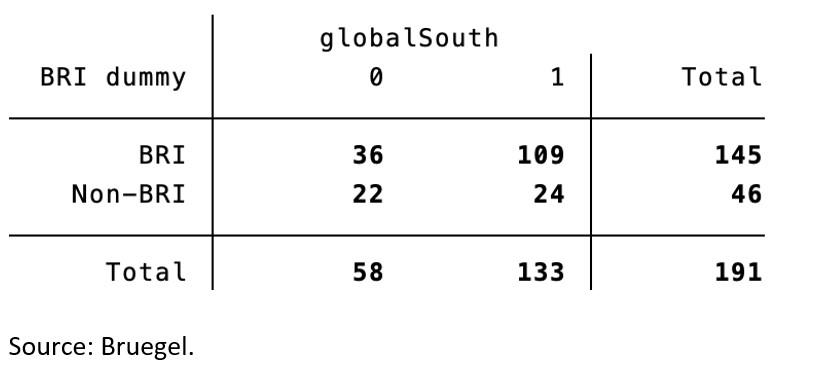
Russian currying of favour with some countries seems also to have influenced their votes on the resolution. Mali shifted from abstaining in earlier votes to voting against following offers of military assistance from Russia and a February 2023 visit by Russian Foreign Minister Sergei Lavrov during which strengthened security and economic cooperation were discussed 4 Niha Masih, 'U.N. resolution to end Ukraine war: How countries voted and who abstained', The Washington Post, 24 February 2023, https://www.washingtonpost.com/world/2023/02/24/un-ukraine-resolution-v…. .
According to the literature on country voting behaviour at the UN 5 See for example Alexander and Rooney (2019), Bailey et al (2017), Che et al (2021), Dreher et al (2008), Dreher and Jensen (2013), Dreher et al (2018a, 2018b), Keohane (1967), Lektzian and Biglaiser (2022), Mosler and Potrafke (2020), Wittkopf (1973), Woo and Chung (2018), Yan and Zhou (2021). , which has focused mainly on countries’ political support for China and the United States, bilateral trade and foreign aid are the most important determinants of voting patterns. Farzanegan and Gholipour (2023) analysed empirically voting behaviour in relation to resolution A/RES/ES-11/1 of 2 March 2022, which condemned Russia’s invasion of Ukraine. They tested a number of economic, military, political, geographical and historical factors that may have influenced countries’ votes in favour of Russia. They found that the probability of voting in favour of Russia is significantly and robustly higher in countries that have defence cooperation agreements with Russia, have longer histories of leftist governments, are major recipients of Russian aid, have political similarities with Russia and have no history of war with the Soviet Union.
An additional influence on countries’ positions on the war in Ukraine has been China’s indirect support for Russia, in the form of a “limitless friendship” 6 See http://www.en.kremlin.ru/supplement/5770. , confirmed by China’s abstention in the vote on the UN Resolution against Russia in 2022 (mentioned above). To explore this channel of China’s influence in the more recent UNGA Resolution and drawing on the above-mentioned literature, we use a multivariate regression analysis (a statistical technique to assess the importance of various factors – listed in Table 2 – influencing countries in their votes) to test the significance of a wider range of factors beyond economic, political and military ties with Russia, grouped into three categories: economic influence, defence cooperation and soft power 7 Descriptive statistics and pairwise correlations of continuous variables, respectively in Table 1A and 2A in the Appendix. .
Table 2 Explanatory variables
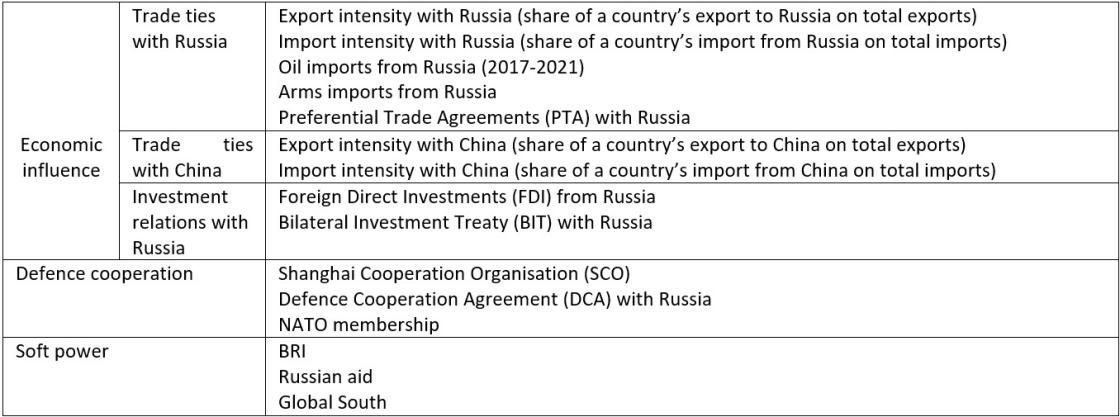
In terms of economic influence, we find empirical evidence in favour of the hypothesis that countries’ votes were mostly influenced by trade with Russia (especially import shares). Imports from Russia positively influenced the probability of voting in favour of Russia, and this is consistent across different models. However, more trade with China, measured by export or import trade intensity, is not significant in explaining UN voting patterns on Ukraine. Nor are the presence of institutional agreements with Russia (preferential trade agreements or bilateral investment treaties), or presence of Russian FDI.
Among the non-economic factors, defence cooperation with Russia and BRI membership both influenced the odds of not voting in favour of Ukraine. Abstentions were mostly driven by belonging to the Global South, while votes in favour of Russia were driven by sizable amounts of state aid from Russia received in the recent past.
Our results are partly consistent with Farzanegan and Gholipour (2023), which showed the relevance of trade ties with Russia for countries’ positions in the UN vote on 2 March 2022 demanding that Russia withdraw from Ukraine. Moreover, we find significant hard and soft power factors at work, including defence cooperation and foreign aid from Russia, together with prima facie evidence of China’s influence through its BRI framework and in the Global South; this significantly influenced decisions by countries to take neutral positions in votes.
Alexander, D. and B. Rooney (2019) ‘Vote-Buying by the United States in the United Nations’, International Studies Quarterly 63(1): 168–176, available at https://doi.org/10.1093/isq/sqy059
Bailey, M. A., A. Strezhnev and E. Voeten (2017) ‘Estimating Dynamic State Preferences from United Nations Voting Data’, Journal of Conflict Resolution 61(2): 430–456, available at https://doi.org/10.1177/002200271559570
Che, Y., H. Xiaoyu and Y. Zhang (2021) ‘Natural Resource Exports and African Countries’ Voting Behaviour in the United Nations: Evidence from the Economic Rise of China’, Revue Canadienne D’economique [Canadian Journal of Economics] 54(2):712–759, available at https://doi.org/10.1111/caje.12514
Dreher, A., A. Fuchs, B. Parks, A. M. Strange and M. J. Tierney (2018a) ‘Apples and Dragon Fruits: The Determinants of Aid and Other Forms of State Financing from China to Africa’, International Studies Quarterly 62(1): 182–194, available at https://doi.org/10.1093/isq/sqx052
Dreher, A. and N. M. Jensen (2013) ‘Country or Leader? Political Change and UN General Assembly Voting’, European Journal of Political Economy 29(March): 183–196, available at https://doi.org/10.1016/j.ejpoleco.2012.10.002
Dreher, A., V. Lang, B. P. Rosendorff and J. R. Vreeland (2018b) ‘Buying Votes and International Organizations: The Dirty Work-Hypothesis’, 5 November, CEPR Discussion Paper No. DP13290, available at https://papers.ssrn.com/abstract=3278665. Accessed 31 March 2022
Dreher, A., P. Nunnenkamp and R. Thiele (2008) ‘Does US Aid Buy UN General Assembly Votes? A Disaggregated Analysis’, Public Choice 136(1–2): 139–164, available at https://doi.org/10.1007/s11127-008-9286-x
Farzanegan, M. R. and H. F. Gholipour (2023) ‘Russia’s invasion of Ukraine and votes in favor of Russia in the UN General Assembly’, International Interactions, available at https://doi.org/10.1080/03050629.2023.2179046
Lektzian, D. and G. Biglaiser (2022) ‘Sanctions, Aid, and Voting Patterns in the United Nations General Assembly’, International Interactions, Advance online publication: 1–27, available at https://doi.org/10.1080/03050629.2023.2155151
Keohane, R. O. and J. S. Nye (1977) (ed) Power and Interdependence: World Politics in Transition, Little, Brown & Co, Boston.
Mosler, M. and N. Potrafke (2020) ‘International Political Alignment during the Trump Presidency: Voting at the UN General Assembly’, International Interactions 46(3): 481–497, available at https://doi.org/10.1080/03050629.2020.1719405
Wittkopf, E. R. (1973) ‘Foreign Aid and United Nations Votes: A Comparative Study’, American Political Science Review 67(3): 868–888, available at https://www.jstor.org/stable/40270856
Woo, B. and E. Chung (2018) ‘Aid for Vote? United Nations General Assembly Voting and American Aid Allocation’, Political Studies 66(4): 1002–1026, available at https://doi.org/10.1177/0032321717739144
Yan, J. and Y. Zhou (2021) ‘Economic Return to Political Support: Evidence from Voting on the Representation of China in the United Nations’, Journal of Asian Economics 75(August): 101325, available at https://doi.org/10.1016/j.asieco.2021.101325
Table 1A Summary statistics

Table 2A Pairwise correlations
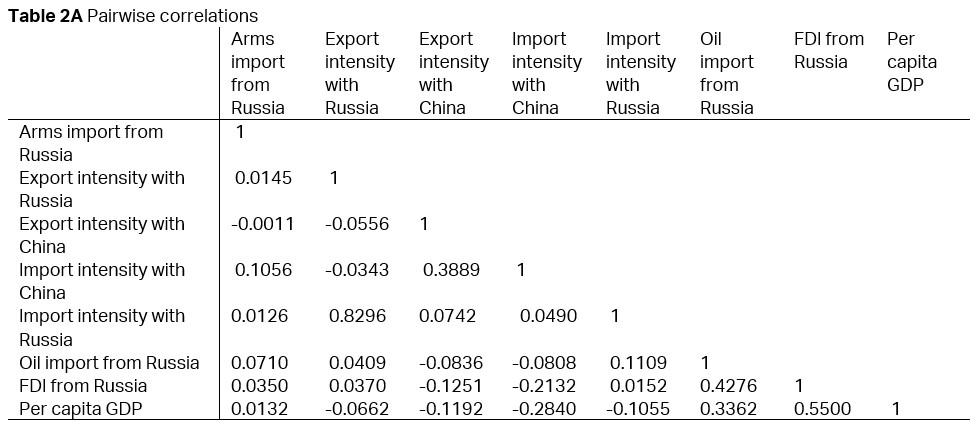
Table 3A presents the drivers of votes in favour of Russia in Ukraine UN resolution A/RES/ES-11/6. In Model 1, votes are grouped into two groups: UN vote is 1 for votes against Ukraine resolution (rejection) or being neutral (abstain or absent); 0 for approval. Therefore, the results show the factors influencing the probability that a country voted in favour of Russia. In Model 2, UN vote is 1 for neutrality in Ukraine resolution (abstain or absent); 0 for approval (votes against Ukraine resolutions are dropped). Therefore, the results show the factors influencing the probability that a country was neutral in Ukraine resolution. In Model 3, votes are grouped into approval (0, base outcome), neutrality (1) and rejections (2).
